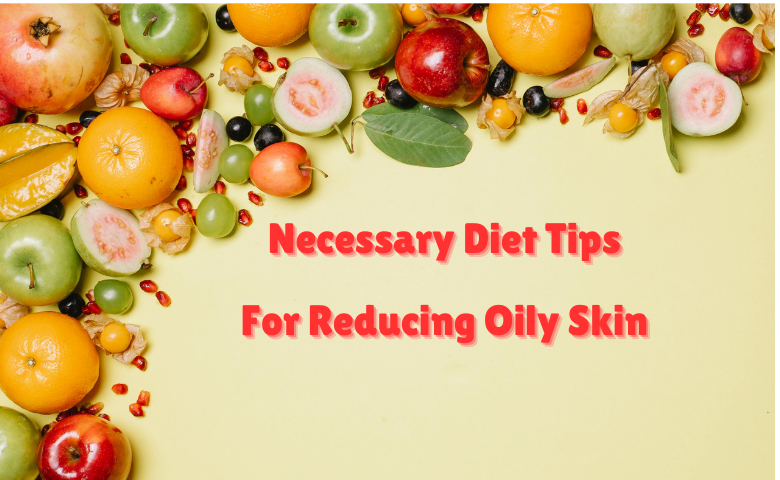
Your diet plays a significant role in the health of your skin, especially if you have oily skin. A balanced diet tailored to oily skin can help reduce greasiness, enlarged pores, acne, blackheads, and whiteheads. While we often turn to topical treatments to address these problems, it’s essential to pay attention to the impact of our diets. By avoiding certain foods, you can better manage oily skin. Would you like to know the necessary diet tips for reducing oily skin? To help address common issues, we’ve compiled a list of foods to include for oily skin. I first come to know about this,
How Diet Affect Oily Skin Health and Create Causes?
The foods you eat can directly impact the health of your skin and create causes for oily skin. Some foods can trigger inflammation and increase oil production, while others can help balance your skin and reduce excess oil. Making smart dietary choices can help you achieve clearer, healthier skin. Several factors, such as genetics, hormonal changes, stress, and environmental factors, can influence oily skin. However, one often overlooked factor is diet. What you eat can either make oily skin worse or help to control it.
Here is the List of Necessary Diet for Reducing Oily Skin
Cucumbers as Hydrating Detox:
Maintaining youthful and healthy-looking skin is essential to keep it well-hydrated. Eating foods with high water content regularly and staying adequately hydrated by drinking water helps to keep the skin moisturized and smooth. If you have acne-prone skin, including cucumber in your daily diet is beneficial. Cucumbers are made up of over 95% water, which helps to cool and hydrate the skin. Additionally, they contain antioxidants with anti-inflammatory properties. Consider using a cucumber mask to alleviate red, inflamed pimples.
Whole Grains:
Eating whole grains rather than processed carbohydrates will improve the texture and appearance of your skin. Choose minimally processed foods; for instance, go for whole wheat bread instead of white bread. Foods high in the antioxidant rutin, such as whole-grain buckwheat, help shield the skin from damage caused by inflammation. Biotin is a B vitamin found in wheat germ that aids lipids’ breakdown. Insufficient biotin in the body can cause scaly, dry, and itchy skin.
Coconut Water:
Coconut water is fantastic for hydrating skin. It keeps the skin smooth and precise and shields it against blemishes, oily skin, and outbreaks. It contains minerals such as magnesium, potassium, and manganese and is an excellent source of calcium, riboflavin, and vitamin C. Additionally, it might have anti-inflammatory properties.
Fresh Fruits and Vegetables :
The health benefits of fresh fruits and vegetables are well known. They help avoid digestive issues, which may contribute to acne and greasy skin. Broccoli, kale, and other green vegetables do not contain any oil. As I’ve already explained, they are high in fiber, which helps control oil production and clear your face. Additionally, spinach has anti-aging properties.
One cup of spinach contains about 164 grams of water. Drinking plenty of water is another aspect of healthy eating. Your sebaceous glands may overproduce oil to counteract the dehydration, tautness, flakiness, and dryness resulting from insufficient water, leaving your skin greasy. Another superfood is broccoli. It contains vitamins A, magnesium, and C, which help keep skin pores open.
Moreover, it calms and reduces inflammation in the skin. It aids in regulating oil production, lowering the chance of acne and other skin problems.
Citrus Fruits:
Vitamin C is fantastic for the skin and is found in citrus fruits like oranges and lemons. Additionally, they have detoxifying ingredients that help your skin get healthier by removing excess oil. Oranges’ inherent oils contribute to the skin’s moisture content. Additionally, they contain citric acid, which improves the texture of your skin by helping to dry out acne.
Conversely, lemons support good liver function and aid in removing toxins from the body, which results in clear, supple skin.
Dark Chocolate:
Something you’ve been waiting impatiently to hear! Dark chocolate is acceptable; you must learn to regulate your portion sizes. Dark chocolate has a higher cocoa content, meaning it has more polyphenols and antioxidants that help protect the skin. In addition to being delicious, dark chocolate regulates the skin’s oil production with antioxidants, which helps avoid acne irritation.
Banana:
Eating a banana regularly can be helpful if you have oily skin. Bananas are rich in potassium, phosphates, and vitamin E, which promotes glowing skin. Another potent detoxifying ingredient is the banana. It may aid in controlling the pores, preventing debris from penetrating your skin and producing an oily build-up. Now that you know what to eat to avoid oily skin, start your beauty routine immediately, and don’t put it off any longer. In no time, your skin will respond favorably!
Lentils and Pulses:
It is well known that lentils are pretty nutrient-dense. They maintain our skin clear by assisting in the regulation of oil production. Pulses are excellent at preserving the oil’s equilibrium. They contain amino acids that don’t break down into sugar, which can increase oil production, and they are known to supply nutrients and proteins.
Carrots:
Carrots are a natural skincare powerhouse because they offer many benefits for the skin. The high levels of carotenoids in these root vegetables have been linked to a more youthful appearance. Whether you consume carrots in your diet or use them topically, they can help promote naturally healthy and radiant skin.
Nuts:
Omega-3 fatty acids are abundant in nuts and are crucial for maintaining clear, healthy skin. They improve skin texture and have anti-inflammatory qualities. However, consuming too many of them may hurt your skin. It is best to limit your intake to a few pieces daily (which should fit inside your fist) or less.
Sample Diet Plan for Reducing Oily Skin
Breakfast Options
- Greek yogurt with berries and a sprinkle of flaxseeds
- Smoothie made with spinach, banana, and almond milk
- Oatmeal topped with walnuts and fresh fruit
Lunch Ideas
- Quinoa salad with mixed greens, cherry tomatoes, and avocado
- Grilled chicken wrap with whole-grain tortilla and veggies
- Lentil soup with a side of whole-grain bread
Dinner Suggestions
- Baked salmon with a side of steamed broccoli and quinoa
- Stir-fried tofu with mixed vegetables and brown rice
- Chickpea and spinach curry with whole-grain naan
Healthy Snacks
- Sliced cucumber with hummus
- Apple slices with almond butter
- Mixed nuts and seeds
Lifestyle Tips to Complement Your Diet
Regular Exercise
Exercise improves circulation and helps regulate hormone levels, which can reduce oiliness. Aim for at least 30 minutes of moderate exercise most days of the week.
Stress Management Techniques
Stress can trigger oil production, so it’s essential to manage it effectively. To keep stress at bay, practice yoga, meditation, or deep-breathing exercises.
Adequate Sleep
Getting enough sleep is essential for skin health. Aim for 7-9 hours of sleep each night to allow your skin to repair and rejuvenate.
Proper Skincare Routine
Use a gentle cleanser, exfoliate regularly, and moisturize with oil-free products. Remember to apply sunscreen daily to protect your skin from UV damage.
Last but not least:
Managing oily skin through dietary changes is a powerful approach that become important for your skincare routine. Being mindful of your foods can significantly reduce excess oil production and achieve clearer, healthier skin. The key is to avoid high-glycemic foods, dairy, and fried items while embracing a diet rich in antioxidants, omega-3 fatty acids, high-fiber foods, and water-rich fruits and vegetables.
Incorporating foods like cucumbers, whole grains, coconut water, fresh fruits, vegetables, citrus fruits, dark chocolate, bananas, lentils, pulses, carrots, and nuts into your daily meals can help balance your skin’s oil levels and reduce the risk of acne and other skin issues. Staying hydrated and consuming probiotics can enhance your skin’s health.
